| Listing 1 - 10 of 16 | << page >> |
Sort by
|
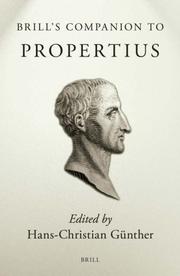
ISBN: 9004136827 9789004136823 9786611384227 1281384224 9047404831 9789047404835 9781281384225 6611384227 Year: 2006 Publisher: Leiden Brill
Abstract | Keywords | Export | Availability | Bookmark
 Loading...
Loading...Choose an application
- Reference Manager
- EndNote
- RefWorks (Direct export to RefWorks)
The present volume provides a comprehensive guide to one of the most difficult authors of classical antiquity. All the major aspects of Propertius' work, its themes, the poetical technique, its sources and models, as well as the history of Propertian scholarship and the vexed problems of textual criticism, are dealt with in contributions by Joan Booth, James Butrica, Francis Cairns, Elaine Fantham, Paolo Fedeli, Adrian Hollis, Peter Knox, Robert Maltby, Tobias Reinhardt and Richard Tarrant; due space is also given to the reception of the author from antiquity and the renaissance (Simona Gavinelli) up to the modern age (Bernhard Zimmermann). At the centre stands an interpretation of the four transmitted books by Gesine Manuwaldt, Hans-Peter Syndikus, John Kevin Newman and Hans-Christian Günther.
Propertius, Sextus --- Criticism and interpretation. --- Propertius, Sextus Aurelius --- Properzio, Sesto --- Properce --- Properzio, S. --- Propercio --- Propercio, Sexto Aurelio --- Properz --- Propert︠s︡īĭ, Sekst --- Propertios --- Properci, Sext --- Propercij --- Propertius, Sextus. --- Propert͡sīĭ, Sekst
Book
ISBN: 9780199563043 9780199563036 Year: 2012 Volume: *24 Publisher: Oxford Oxford university press
Abstract | Keywords | Export | Availability | Bookmark
 Loading...
Loading...Choose an application
- Reference Manager
- EndNote
- RefWorks (Direct export to RefWorks)
"This volume focuses on the great Roman love poet Propertius. Propertius' poetry reveals an ardent love affair between the poet and his girlfriend, whom he calls 'Cynthia', yet it also offers a snapshot of life in ancient Rome during the Augustan age (circa 20s BCE). While this was a period of growth and revival after the crippling civil wars of the previous century, it was also a time when Rome was adjusting to a new form of government under its first emperor. 'Oxford Readings in Classical Studies: Propertius' is the first volume on Propertius' poetry to bring together some of the best and most influential scholarship written during the last three decades and put them into dialogue with each other. The articles discuss the recent developments in Propertius scholarship, as well as major critical approaches that have emerged in classical studies in general, and look at issues of text, intertextuality, gender, and the social and political context of Propertius' work"--Publisher's description, back cover.
Elegiac poetry, Latin --- History and criticism --- Propertius, Sextus --- Propertius, Sextus Aurelius --- Properzio, Sesto --- Properce --- Properzio, S. --- Propercio --- Propercio, Sexto Aurelio --- Properz --- Propert︠s︡īĭ, Sekst --- Propertios --- Properci, Sext --- Propercij --- Criticism and interpretation.
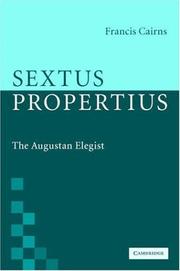
ISBN: 0521864577 9780521864572 Year: 2006 Publisher: Cambridge [etc.] Cambridge University Press
Abstract | Keywords | Export | Availability | Bookmark
 Loading...
Loading...Choose an application
- Reference Manager
- EndNote
- RefWorks (Direct export to RefWorks)
Elegiac poetry, Latin --- Love poetry, Latin --- Poésie élégiaque latine --- Poésie d'amour latine --- History and criticism --- Histoire et critique --- Propertius, Sextus --- Criticism and interpretation --- History and criticism. --- Criticism and interpretation. --- Poésie élégiaque latine --- Poésie d'amour latine --- Propertius, Sextus Aurelius --- Properzio, Sesto --- Properce --- Properzio, S. --- Propercio --- Propercio, Sexto Aurelio --- Properz --- Propert︠s︡īĭ, Sekst --- Propertios --- Properci, Sext --- Propercij
Book
ISBN: 9780199571499 0199571481 019957149X 9780199571482 Year: 2011 Publisher: Oxford: Oxford university press,
Abstract | Keywords | Export | Availability | Bookmark
 Loading...
Loading...Choose an application
- Reference Manager
- EndNote
- RefWorks (Direct export to RefWorks)
Elegiac poetry, Latin --- Latin elegiac poetry --- Latin poetry --- Propertius, Sextus. --- Propertius, Sextus --- Propertius, Sextus Aurelius --- Properzio, Sesto --- Properce --- Properzio, S. --- Propercio --- Propercio, Sexto Aurelio --- Properz --- Propert︠s︡īĭ, Sekst --- Propertios --- Properci, Sext --- Propercij --- Criticism and interpretation. --- Properce, 0050?-0015? av. J.-C.
Book
ISBN: 3769615905 9783769615906 Year: 1997 Volume: 1997,2 Publisher: München : Bayerische Akademie der Wissenschaften,
Abstract | Keywords | Export | Availability | Bookmark
 Loading...
Loading...Choose an application
- Reference Manager
- EndNote
- RefWorks (Direct export to RefWorks)
Elegiac poetry, Latin --- Self in literature --- History and criticism --- -Latin elegiac poetry --- Latin poetry --- Propertius, Sextus --- Propertius, Sextus Aurelius --- Properzio, Sesto --- Properce --- Properzio, S. --- Propercio --- Propercio, Sexto Aurelio --- Properz --- Propert︠s︡īĭ, Sekst --- Propertios --- Properci, Sext --- Propercij --- Rome --- In literature. --- Self in literature. --- History and criticism. --- Propertius, Sextus. --- -History and criticism --- Criticism and interpretation --- Elegiac poetry, Latin - History and criticism --- Properce (sextus propertius), poete latin, 47-16 av.j-c.
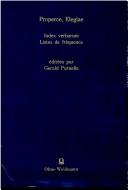
ISBN: 3487103230 9783487103235 Year: 1997 Volume: 187 Publisher: Hildesheim Zürich New York Olms-Weidmann
Abstract | Keywords | Export | Availability | Bookmark
 Loading...
Loading...Choose an application
- Reference Manager
- EndNote
- RefWorks (Direct export to RefWorks)
Latin language --- Glossaries, vocabularies, etc. --- Word frequency. --- -Latin language --- -Classical languages --- Italic languages and dialects --- Classical philology --- Latin philology --- Glossaries, vocabularies, etc --- Word frequency --- Propertius, Sextus --- -Propertius, Sextus --- -Propertius, Sextus Aurelius --- Properzio, Sesto --- Properce --- Properzio, S. --- Propercio --- Propercio, Sexto Aurelio --- Properz --- Propert︠s︡īĭ, Sekst --- Propertios --- Properci, Sext --- Propercij --- Concordances --- Language --- -Glossaries, etc --- Propertius, Sextus. --- Concordances. --- Glossaries, etc. --- -Glossaries, vocabularies, etc --- -Concordances --- Classical languages --- Propertius, Sextus Aurelius --- Latin language - Glossaries, vocabularies, etc. --- Latin language - Word frequency.
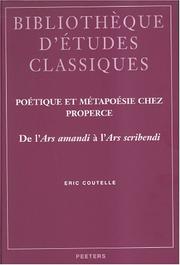
ISBN: 9042915889 2877238539 9789042915886 Year: 2005 Volume: 44 Publisher: Louvain Peeters
Abstract | Keywords | Export | Availability | Bookmark
 Loading...
Loading...Choose an application
- Reference Manager
- EndNote
- RefWorks (Direct export to RefWorks)
Elegiac poetry, Latin --- Love poetry, Latin --- Poésie élégiaque latine --- Poésie d'amour latine --- History and criticism. --- Histoire et critique --- Propertius, Sextus. --- Propertius, Sextus --- Technique. --- Rhetoric, Ancient --- History and criticism --- Technique --- Poésie élégiaque latine --- Poésie d'amour latine --- Ancient rhetoric --- Classical languages --- Greek language --- Greek rhetoric --- Latin language --- Latin rhetoric --- Rhetoric --- Propertius, Sextus Aurelius --- Properzio, Sesto --- Properce --- Properzio, S. --- Propercio --- Propercio, Sexto Aurelio --- Properz --- Propert︠s︡īĭ, Sekst --- Propertios --- Properci, Sext --- Propercij --- Acqui 2006 --- Propertius, Sextus. - Elegiae --- Amour --- Poétique. --- Dans la littérature --- Dans la littérature. --- Properce, --- Critique et interprétation. --- Thèmes, motifs. --- Élégies. --- Élégies
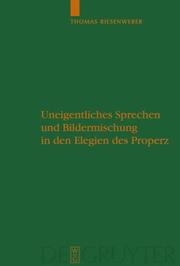
ISSN: 18621112 ISBN: 3110192497 9783110192490 3110924129 Year: 2007 Volume: Bd. 86 Publisher: Berlin de Gruyter
Abstract | Keywords | Export | Availability | Bookmark
 Loading...
Loading...Choose an application
- Reference Manager
- EndNote
- RefWorks (Direct export to RefWorks)
Die Arbeit ist die erste umfassende Studie über den properzischen Metapherngebrauch, der bereits Hertzberg als wichtigstes Merkmal der eigenwilligen Sprache des Dichters galt. Nach einer Einführung in die antike und moderne Metapherntheorie werden zahlreiche Aspekte uneigentlichen Sprechens und von Bildersprache im weiteren Sinne in den Elegien des Properz beleuchtet, darunter Vergleiche, Priameln, Sprichwörter, Allegorien, mehrstufige Verfremdungen (Metalepsen), Euphemismus und Drastik, Periphrasen. Ferner werden die verschiedenen Formen der Interaktion von Metaphern und Metonymien mit der Realebene untersucht, u. a. das Phänomen der ,Intrusion', Zeugmata und Amphibolien, verschiedene Identitätsstufen von Gottheiten, kühne Brachylogien und Synästhesien. Ein weiterer Schwerpunkt liegt auf der Analyse der Metaphernkontaminationen und der oft assoziativ verknüpften Metaphernfelder; dabei werden v. a. die nach alexandrinischer Manier besonders symbolreichen programmatischen Elegien der Bücher II-IV in den Blick genommen. Es zeigt sich, dass viele Kühnheiten, die in der modernen Properzforschung gerne mit dem Mittel der Konjekturalkritik beseitigt werden, dem originellen Sprach- und Stilempfinden des Properz zuzuschreiben sind.
Elegiac poetry, Latin --- Latin language --- Rhetoric, Ancient. --- Metaphor. --- Metonyms. --- Poésie élégiaque latine --- Latin (Langue) --- Rhétorique ancienne --- Métaphore --- Métonymie --- History and criticism. --- Figures of speech. --- Histoire et critique --- Figures de rhétorique --- Propertius, Sextus --- Propertius, Sextus. --- Language --- Criticism, Textual. --- Poésie élégiaque latine --- Rhétorique ancienne --- Métaphore --- Métonymie --- Figures de rhétorique --- Metaphor --- Metonomy --- Rhetoric, Ancient --- Ancient rhetoric --- Classical languages --- Greek language --- Greek rhetoric --- Latin rhetoric --- Parabole --- Figures of speech --- Reification --- History and criticism --- Rhetoric --- Propertius, Sextus Aurelius --- Properzio, Sesto --- Properce --- Properzio, S. --- Propercio --- Propercio, Sexto Aurelio --- Properz --- Propert︠s︡īĭ, Sekst --- Propertios --- Properci, Sext --- Propercij --- Metonymy --- Elegy. --- Propertius.
Book
ISBN: 9780199652396 0199652392 0191745782 1299160042 0191626236 9780191626234 9780191745782 9781299160040 Year: 2013 Volume: *4 Publisher: Oxford Oxford University Press
Abstract | Keywords | Export | Availability | Bookmark
 Loading...
Loading...Choose an application
- Reference Manager
- EndNote
- RefWorks (Direct export to RefWorks)
Gardner looks at the gendered language of time applied to men and women in Latin love elegy. Focusing on the poetry of Propertius, Tibullus, and Ovid, she uses Kristeva's theory of 'women's time' to explain the cyclicality, repetition, and eternity attributed to the elegiac beloved, often identified as a courtesan-puella (girl).
Elegiac poetry, Latin --- History and criticism. --- Time perception in literature. --- Latin poetry --- Sex differences in literature. --- Propertius, Sextus --- Tibullus --- Ovid, --- Nasó, P. Ovidi, --- Naso, Publius Ovidius, --- Nazon, --- Ouidio, --- Ovide, --- Ovidi, --- Ovidi Nasó, P., --- Ovidiĭ, --- Ovidiĭ Nazon, Publiĭ, --- Ovidio, --- Ovidio Nasón, P., --- Ovidio Nasone, Publio, --- Ovidios, --- Ovidiu, --- Ovidius Naso, P., --- Owidiusz, --- P. Ovidius Naso, --- Publiĭ Ovidiĭ Nazon, --- Publio Ovidio Nasone, --- Ūvīd, --- אוביד, --- Tibullus, Albius --- Tibulle --- Tibuliano --- Tibulo --- Tibulo, Albio --- Tibull, Alʹbīĭ --- Tibullo, Albio --- Tivoullos, Alvios --- Propertius, Sextus Aurelius --- Properzio, Sesto --- Properce --- Properzio, S. --- Propercio --- Propercio, Sexto Aurelio --- Properz --- Propert︠s︡īĭ, Sekst --- Propertios --- Properci, Sext --- Propercij --- Criticism and interpretation. --- Rome --- Ovid --- Ovidius Naso, Publius,
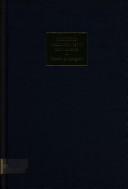
ISBN: 0521323142 0521106532 0511753551 9780521323147 9780511753558 9780521106535 Year: 1987 Publisher: Cambridge Cambridge University Press
Abstract | Keywords | Export | Availability | Bookmark
 Loading...
Loading...Choose an application
- Reference Manager
- EndNote
- RefWorks (Direct export to RefWorks)
The bond between love and death has long been recognised as a defining characteristic of the elegies of Propertius, but scholars have rarely clarified how or to what degree Propertius differed from other love poets in associating these themes. In this book, Dr Papanghelis traces the radical way in which Propertius dealt with amorous and morbid fantasies in his poems. He argues that the modes of erotic expression used in the elegies are fundamentally unconventional, to the point that the definitions of love and death are interdependent. This book offers a detailed reading of some of the most stimulating and problematic of Propertius' elegies, offering fresh insight on the question of the poet's sensuous temperament and the significance of the love-death relationship in his works.
Love in literature --- Death in literature --- Amour dans la littérature --- Mort dans la littérature --- Properce, --- Criticism and interpretation --- Critique et interprétation --- Elegiac poetry, Latin --- Love poetry, Latin --- History and criticism --- Propertius, Sextus --- Rome --- In literature --- 871 PROPERTIUS, SEXTUS AURELIUS --- -Love poetry, Latin --- -Rome in literature --- Latin love poetry --- Latin poetry --- Latin elegiac poetry --- Latijnse literatuur--PROPERTIUS, SEXTUS AURELIUS --- Propertius, Sextus Aurelius --- Properzio, Sesto --- Properce --- Properzio, S. --- Propercio --- Propercio, Sexto Aurelio --- Properz --- Propert︠s︡īĭ, Sekst --- Propertios --- Properci, Sext --- Propercij --- Death in literature. --- Rome in literature. --- History and criticism. --- Propertius, Sextus. --- 871 PROPERTIUS, SEXTUS AURELIUS Latijnse literatuur--PROPERTIUS, SEXTUS AURELIUS --- Amour dans la littérature --- Mort dans la littérature --- Critique et interprétation --- In literature. --- Arts and Humanities --- History --- Elegiac poetry, Latin - History and criticism --- Love poetry, Latin - History and criticism --- Propertius, Sextus - Elegiae --- Rome - In literature
| Listing 1 - 10 of 16 | << page >> |
Sort by
|

 Search
Search Feedback
Feedback About UniCat
About UniCat  Help
Help News
News